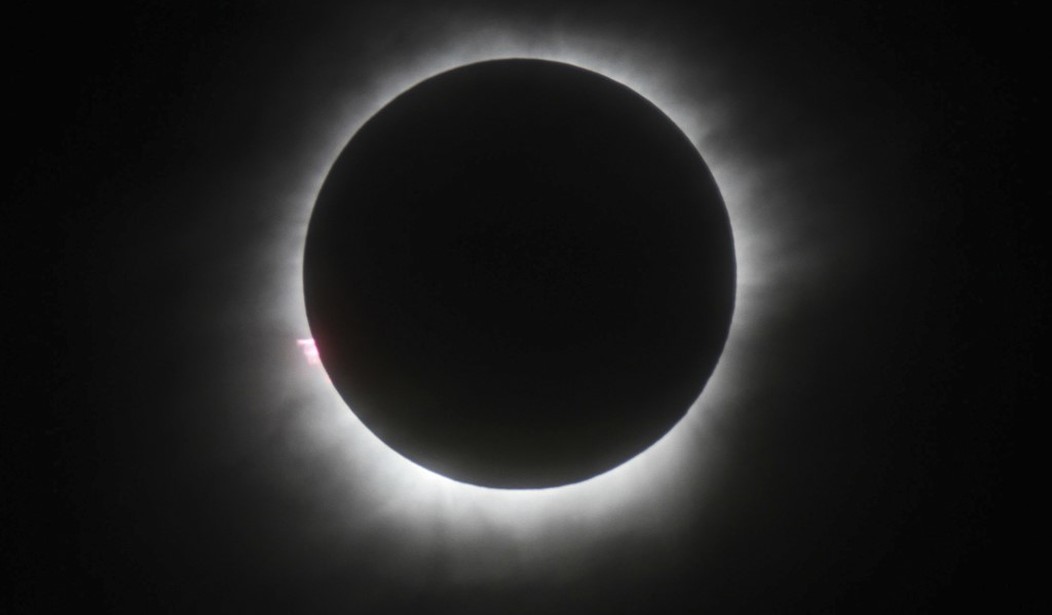Whether one believes that God created the universe on purpose, or that something else did in a random and chaotic manner – the Big Bang comes to mind – it's difficult to argue against the order of the cosmos. This order will be visible on April 8 when millions of Americans can witness a total eclipse of the sun as the path of totality arcs across the nation from the Rio Grande Valley to northern Maine.
This is a very big deal for a lot of people. Because Texas is less prone to cloud cover and will be the first state to experience this eclipse, droves of people are traveling to the Lone Star State to see it. So many people are coming to north Texas that Kaufman County, which is adjacent to Dallas, declared a state of emergency. So has the entire state of Indiana.
The Royal Museum of Greenwich, England explains why this event is so extraordinary. A total solar eclipse is visible somewhere on Earth about once every 18 months. The last time people witnessed this phenomenon where I live in north Texas was July 29, 1878, beating the Royal Museum's estimated average of about 400 years between total solar eclipses passing over any given point on the planet.
But is this eclipse a function of chaos or order? Science, for its part, provides us with something of a paradox. Some speculate that the origin of the universe was utter chaos at the moment of the Big Bang. Others theorize, "we live in a chaotic universe that, in many ways, is completely unpredictable," while others still say cosmic rotation is increasing chaos in the universe. At the same time, it's thought that there is order in the universe but this aforementioned chaos hides certain patterns. Which is it?
Recommended
To the extent there are hidden patterns in the universe, there are many to discover for one simple reason: We can only see about 5% of our universe. The other 95% is completely invisible to us, most of it described by science as dark energy – about 68% – and dark matter, reckoned to comprise another 27%.
We know little about dark matter and dark energy, but we know a little more about the remaining 5% of the universe and it appears to be put together rather well. Monday's eclipse demonstrates how well. One newspaper, The Oklahoman, reported "On April 8, 2024, a total eclipse will pass over the far southeastern corner of Oklahoma and through Dallas." That might sound mundane today until realizing that this report was published on April 30, 2000.
The order in the observable universe is so precise, a newspaper in Oklahoma City reported on next week's eclipse nearly a quarter century in advance, and astronomers calculated the date and time before that. Such exact calculations are impossible in a random, chaotic environment. It is because of the structural precision of our universe that very smart people can calculate when a solar eclipse will occur. In case you're curious, the next one that can be seen in the United States will happen on August 23, 2044.
Skeptics of the biblical account of creation are free to lecture us on how the creation story in Genesis cannot possibly be true, and non-believers routinely deride Bible-believing Christians as bumpkinesque rubes as they explain how it wasn't God that created the universe, but something else.
That "something else" embraced by science and people who claim to follow it cannot be seen, cannot be fully explained and cannot be proved. It encapsulates a belief system requiring faith that the quantum vacuum – which some believe created everything out of nothing – a second Big Bang about a month later, and other theories played some part in creating the universe. However, it's difficult to argue for a chaotic universe in light of the consistent accuracy with which astronomers can calculate when solar eclipses will take place.
Many so-called rationalists who believe in things they cannot see, explain or prove ridicule Christians for believing in things they cannot see, explain or prove. But how is a belief that a timeless, all-powerful God created an orderly universe any more preposterous than a belief that the quantum vacuum created everything out of nothing in an accidental explosion?
Wise people will admit that science does not know for sure how the universe came to be. They have theories and conjecture to support their belief in a chaotic, random event somewhere in time and space, and a strong faith in those theories. But the exactitude within the observable universe which reflects the first sentence of the Bible – In the beginning, God created the heavens and the earth – will be on full display during the afternoon of April 8. It promises to be a glorious exhibition of the absolute and limitless genius of the Creator.
























Join the conversation as a VIP Member